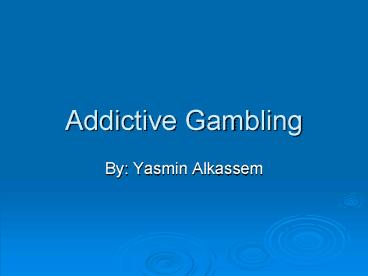Addictive Gambling PowerPoint PPT Presentation
1 / 9
Title: Addictive Gambling
1
Addictive Gambling
- By Yasmin Alkassem
2
In order for an individual to be diagnosed as an
addictive gambler, an individual must accomplish
at least four of the following
- Progression (increasing preoccupation with
gambling) - Tolerance (increased time or money spent on
gambling) - Withdrawal (insomnia, restlessness, irritability)
- Loss of control over gambling
- Escape gambling
- Lies and deception
- Family or job disruptions
- Financial bailouts
- Illegal acts
3
- A survey in Washington State found that 79
percent of gamblers gamble for entertainment, 69
percent want to win money, 59 percent gamble for
the excitement, 51 percent want to socialize, and
50 percent want to support worthy causes. - In Washington State, women and surveyors over the
age of 30 were significantly more likely than men
and surveyors under the age of 30 to say that
they gamble to support worthy causes. - Male surveyors in Montana and South Dakota were
more likely than women to say that they gamble to
win money.
4
- Addictive gambling is a problem that can damage
more than just a persons finances. - Research from the United States shows that
suicide attempts for pathological gamblers are
higher than those with other addictions. One of
every five will attempt suicide. - Problem gamblers have high rates of depression
and suicidal ideation.
5
- Wives of problem gamblers have experienced
psychological and physical abuse. - Many of the spouses suffer from depression and
stress. - 22 percent of compulsive gamblers divorced
because of gambling. - 40 percent loose or quit a job due to gambling.
- 49 percent have stolen from work to pay gambling
debts. - 23 percent are alcoholics, 26 percent are
compulsive overeaters, 63 percent have
contemplated suicide, and 79 percent said they
wanted to die.
6
- Children with compulsive gambler parents are far
more likely to have issues with gambling
themselves. - 75 percent of problem gamblers children had
their first gambling experience before the age of
11. - When children get overly involved in a poker
game, they will follow the same behavior patterns
of a drug addict or an alcoholic. - Children of a gambler parent (s) are at a greater
risk of using alcohol and drugs. They will be in
trouble with the law and suicidal. - Children will get anxious, depressed, refuse to
go to school, perform poorly in school, withdraw
from friends and activities, and will worry about
parents worries. - Children can also have a sense of loss. This
loss may be for a parent who is away gambling for
long periods. Children will feel as if they lost
security and trust. - 23 percent of spouses and 17 percent of the
children of addictive gamblers were physically
abused. - There is a 53 percent of divorce rate of all
pathological gamblers.
7
How is the environment at an addictive gamblers
home?
- Loud arguments
- Yelling
- Delicate objects thrown
- Wives beaten while the children are crying
8
- Most crimes committed by gamblers are non
violent, but some problem gamblers have
demonstrated the opposite. - Theft
- Vandalism
- Driving under the influence
- Weapon offenses
9
How do you treat individuals with addictive
gambling?
- Pressure from the family.
- Court order to seek professional treatment
(attend meetings). - Just as an alcoholic cannot have one more drink,
a gambler cannot place another bet. - Communities have to take a more proactive
approach to this problem, including putting more
pressure on casinos and large gambling
organizations to improve their business methods
to be more ethical. - For example, casinos could train staff to spot
problem gamblers and stop outrageous bets from
taking place. - Casinos should be forced to broadcast public
awareness commercials. - Addictive gambling causes chaos in families and
tears them apart. It burdens society with
increased prices, crimes, and taxes.

